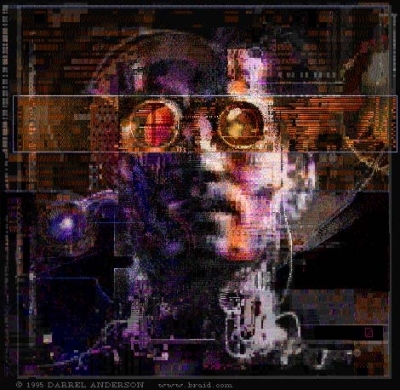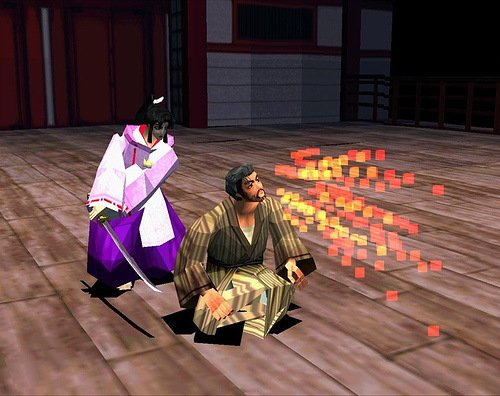On April 11, I packed my knapsack, put on my traveling cloak, kissed my mother, and set off from the homestead to find fortune in the greater world. After a trip in a van, two airplanes, a bus that went underground, and another train, I found myself in front of the Boston Marriott at Copley Plaza. In the spacious lobby, I saw a motley assortment of my colleagues, who had arrived for the annual PCA/ACA National Conference. By this point I was so addled by having gone up and down so many times, not to mention the sheer Transformers-like boggle of having been in a bus that hooked up to electric cables and went drove through an underground tunnel pretending it was the metro, I managed to stammer my way through getting my room key. After riding up to the twenty-sixth floor, I deposited my stuff in a room I was sharing with my friend and went in search of adventure.
My first experience was inauspicious: at registration, I put my name card in my pocket, couldn't find it in my bag, and went back to ask for it. Only when the no doubt overworked but extremely patient and polite gentleman told me to look in my pocket did I realize my mistake. Feeling a sheepishness not even my all-black outfit could fully overcome (no doubt due to the fact that I was still wearing white sneakers; I was going to be doing a lot of walking!) I wandered around the conference, checking out the book tables and marking the panels I wanted to go to the next day.
That afternoon, I ran into an old friend from my undergraduate/MA years, who now lives near Boston and showed me and my friend from my current university around. We met up by the huge old library that had murals on the walls and a fine collection of nineteenth century manuscripts, including original letters from Poe and Hawthorne, and set off for Chinatown. We received some second-hand martial arts wisdom and bought some squid jerky, and we also went into a small cafe to buy some bubble tea. We waited perhaps ten minutes in front of the display case while every other customer to walk into the store after us went right up to the counter, pushing aside whoever was already there to place an order. When we finally did order, the nice girl recommended that I try the tea I ordered hot, and then asked me to make sure it was sweet enough after she prepared it for me. It was a surprising bit of kindness after the mild frustration of waiting.
We took our obligatory photos by the big touristy gates, then had dinner at a restaurant that used to be a theater. The walls were beautifully painted with scenic illustrations, and the walls had decorations of carved dragons and other mythical beasts. Although the room was huge, there were only a few families there, and we didn't get to experience having dim sum brought to us on carts. Instead, we ordered from menus, and ended up gorging ourselves on the various still-steaming balls of meat-stuffed dough. When we were done, we told our waiter we wanted our check split three ways, which caused a bit of tension and meant we shuffled out of there as fast as we could, considering the size of the meal we had just eaten.
The day done, I turned in early, and I got up early on Thursday to start attending panels properly. I was surprised to see two of my Howardian cohorts at a panel about science fiction and fantasy, so we touched base and went out to lunch. (I ended up eating perhaps the most expensive burger I have ever eaten, a blow which was only slightly softened by it being stacked so high I had to eat it with a knife and fork.) I couldn't get over how fantastic it is to talk to people who knew much more about one of my favorite topics than I do. Hearing some of the experts in the field of Howard studies discourse about his writings is the reason I went back to the PCA after last year. Sometimes I think I know a thing or two, but the level of understanding and background knowledge these guys has always leaves me listening wide-eyed and trying to remember as much as I can. At one point, I mentioned that the Howardian mountain man Breckenridge Elkins is bearded, but at a later panel every picture showed him clean-shaven. I guess I just assumed, given how often he's compared to a grizzly bear. My paradigm got thoroughly shifted.
I ended up on the last of three panels in the Pulp Studies field. I felt every panel was very interesting, though I admit I had a bit of trouble keeping my eyes open for some of it. (You can see me coming close to nodding off in the second row in a picture on
Mark Finn's blog on the same topic.) This was no reflection on the quality of the presentations. One of my comrades-in-arms wrote about C.L. Moore, Margaret Brundage, and the portrayal of female adventurer Jirel of Joiry in
Weird Tales (I particularly remember the part that in one scene in Moore's story Jirel changes out of armor into a fresh suit of armor; for her, there is no 'change' between selves--the identity in armor is her real identity). There was also a bit of debate about whether the horrors in
At the Mountains of Madness represented immigrants, blacks, or a giant poo monster. There was an interesting connection made between the Necronomicon and censorship (forbidden knowledge!). One of my favorite readings was Mark Finn's presentation about gorillas in Howard's writings. I've often remarked about the frequency with which Howardian heroes come to grips with giant apes, and Mark made some great connections with race, barbarism, and evolution.
If anybody asks why I didn't go to George Takei's talk, I was learning about Robert E. Howard and killer gorillas, which is probably the best excuse I can think of for missing something like that.
As for my own panel, it's frankly a bit of a blur for me. I can't say much about it other than I was terrified, nervous, and I realized that my paper barely made sense to me as the writer, and anyone who was listening was bound to be even deeper in the dark. Everyone was nice about it, though, and I made a thorough mental note to write something more reasonable and straightforward next time and leave connecting Howardian heroes to political philosophy for people who understand that stuff a lot better than I do!
After I collapsed gasping and panting on the other end of my ordeal, we went out for dinner and drinks. This was my favorite part of the conference and worth the price of admission. The topic ranged from
Weird Tales, movies, video games, collecting, comics, roleplaying games, and all sorts of other stuff. We ran into a young gentleman we talked to the last year who was in game studies, and we set up a time we would all get together to chuck some dice and talk about elves on Friday night.
My panel completed, or at least over, Friday was a lot easier for me. I attended my UNL friend's presentation, which was stuck early in the morning in a suite up on the thirty-somethingth floor, so the attendance was sadly thin. One day's other highlight panels for me were the Western panel on which one of my Howardian colleagues read about Breckenridge Elkins and rough-and-tumble fighting, which I never knew was a
particular fighting style with its own techniques and rituals. The next highlight was the gaming panel about mapping. I had never put that much careful thought into the science of mapping out a roleplaying world, whether as the DM or as a player. While it's certainly true that Conan never carries around a compass and sketches out everywhere he's been, creating a map of the world one visits is an interesting 'living document' mixing elements of cartography with storytelling.
The Friday night Dungeons and Dragons game (I'll admit, it wasn't
technically D&D, since we were playing the rules set developed by one of the gentlemen there, called
Adventurer Conqueror King (and let me take another parenthetical to say how perfectly that title for the game matches up with playing with a bunch of Howardians)). We played for a while in one of the conference rooms, but then we moved out into one of the lobbies because the night crew had to come in to clean. We were there so late they even shut down the escalators. The adventure was a great deal of fun, though we didn't get to see nearly all of the dungeon or accomplish any of our goals. It captured the missing element of many of the games I had been in before: that sense of going into the unknown with a bunch of untrustworthy cutthroats (including a Family of vermin killers, an elderly priestess of a shall we say reproductive deity, a trio of mad priests worshiping a god of decay, and more kill-crazed dwarves than it is entirely safe to be around). Without modern hand-holding such as balanced encounters and linear paths, we experienced the true paranoia of exploring a mysterious dungeon where everything was trying to kill us, an experience made all the more terrifying by our precariously low hit points and the horrifying results of being incapacitated (having to roll on a chart to see our crippling injury). We spent most of our time not fighting or exploring but debating about which course of action was least likely to lead to our awful demise. Amidst a table crammed with snacks, we played in our imaginations, making only crude diagrams to show our marching order and not relying on figures to mark our places on a board. This made the game much more colorful for me, since it all happened in my mind, which has an even better budget for special effects than a well-stocked game board. Overall, this is exactly the kind of roleplaying experience I most enjoy.
After staying up to around two in the morning (after everyone announcing around ten how beat we all were), I staggered into bed and returned the next day to my university, staggering in a semi-conscious state through the airports. When I got back, my head was still buzzing and a list of things to research. If I find my camera, I'll add pictures to this blog. For the moment, it's lost in Movingspace, the place things go when you move and can't find them while unpacking.



